 Free Neurolens Evaluations
Your Solution to Eye Alignment
Free Neurolens Evaluations
Your Solution to Eye Alignment
Neurolens evaluations are currently offered at our Geneva location.

What are Neurolenses? A New Benchmark in Vision Comfort
Neurolenses are eyewear designed to address eye misalignment. Traditional glasses typically correct refractive errors like nearsightedness or farsightedness. Neurolenses are different, providing varying degrees of prismatic correction at different distances.
Small misalignments can lead to significant discomfort, especially in a digital-heavy setting. Neurolenses use a unique, contoured prism approach to minimize eye strain and other discomforts associated with digital vision syndrome.
Signs of Eye Misalignment
 Headaches
Headaches Eye Strain
Eye Strain Neck + Shoulder Pain
Neck + Shoulder Pain Dizziness
Dizziness Dry Eyes
Dry Eyes Light Sensitivity
Light Sensitivity
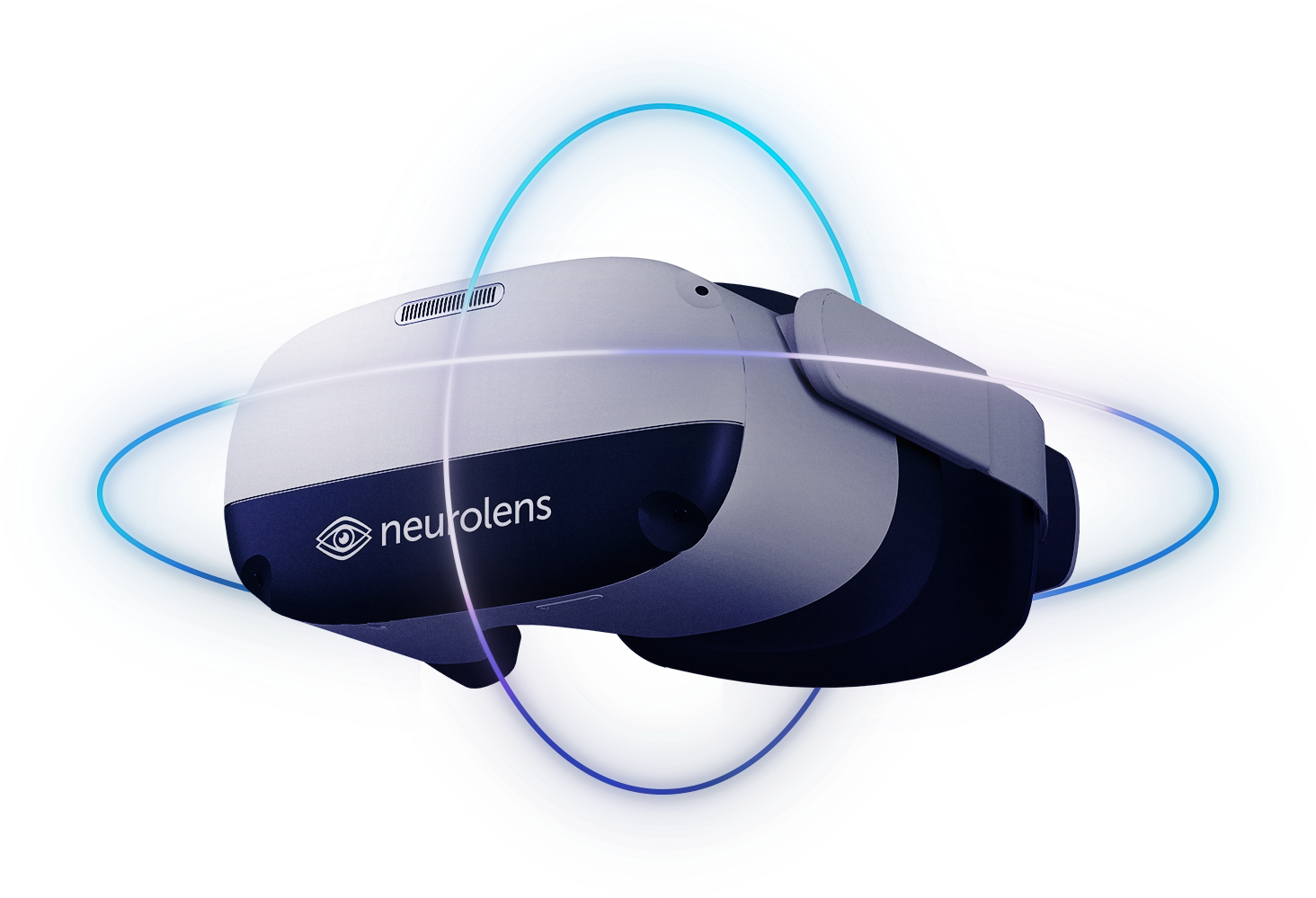
How It Works
Experience the Future with 360° VR Technology
The Neurolens N3 is a cutting-edge ocular measurement system designed for eye care professionals. The N3 delivers unparalleled accuracy, drawing on a comprehensive database. The N3 leverages over ten billion data points derived from patient visual behavior, accumulated through more than a decade of successful outcomes.
This innovative system provides patients with a unique, interactive experience to blend education and precise measurements. The N3 allows eye care providers to evaluate eye misalignment down to a fraction of a prism diopter. The Neurolens N3 represents a significant leap forward in ocular diagnostics.
4 Key Advantages of Neurolens Backed by Scientific Studies
Study Overview: Neurolens Impact on Reading Speed
“At 30 minutes, Neurolens users improved by 10 words versus 5.67 for the control group. After one week, the difference widened to 27.83 words (Neurolens) versus 15.90 (control).”
Methodology:
This study compared Neurolenses to control lenses, involving 45 young adults (23 Neurolens, 22 control). Using the Wilkins Rate of Reading Test, reading speed was measured at baseline, 30 minutes after receiving glasses and at 7 and 35 days post-dispensing. The study evaluates both immediate and long-term effects of Neurolenses on reading speed.
Results and Implications:
While both groups showed improvement, the Neurolens group demonstrated significantly greater increases in reading speed. At 30 minutes, Neurolens users improved by 10 words versus 5.67 for the control group. After one week, the difference widened to 27.83 words (Neurolens) versus 15.90 (control). This improvement was maintained for 35 days. Neurolenses provide significant and sustained improvement in reading speed, suggesting potential benefits for productivity and digital well-being.
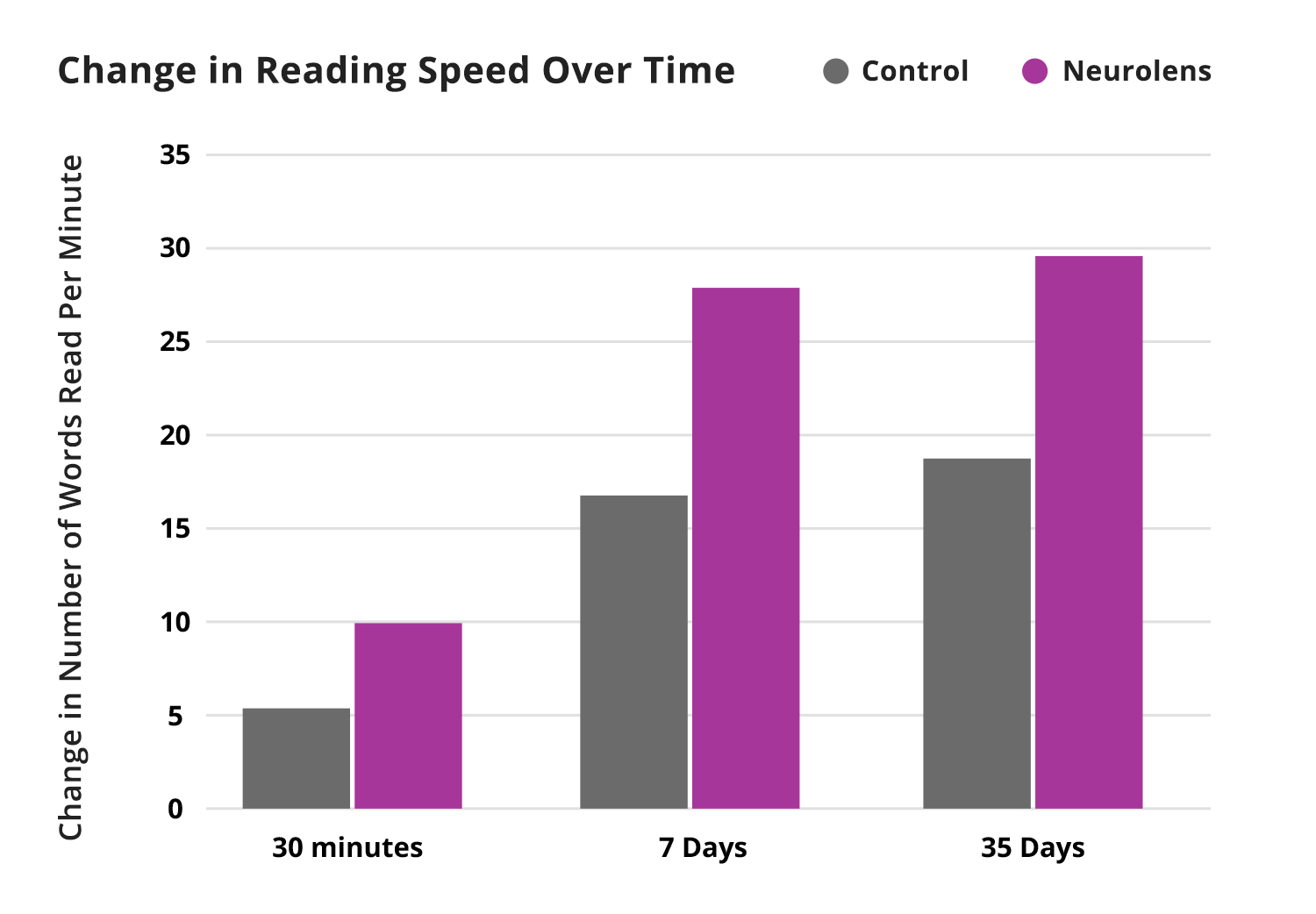
Study Overview: Neurolens Impact on Headache Symptoms
“When compared to pharmacological interventions like Aimovig, Botox and Topamax from previous studies, Neurolenses demonstrated comparable symptom relief based on HIT-6 scores.”
Methodology:
This double-masked, randomized study compared Neurolenses to control lenses in reducing headache symptoms. The study used the HIT-6 (Headache Impact Test) questionnaire to measure symptom changes. Participants wore either Neurolenses or control lenses for 20-40 days. They evaluated the effectiveness of Neurolenses in treating vision-related headaches and digital eye strain symptoms.
Results and Implications:
Neurolenses showed statistically significant improvement in headache symptoms compared to control lenses (p = 0.01). One in two individuals reported a clinically significant reduction in symptoms (>2.5-point reduction on HIT-6) after wearing Neurolenses. When compared to pharmacological interventions like Aimovig, Botox and Topamax from previous studies, Neurolenses demonstrated comparable symptom relief based on HIT-6 scores. The Neurolens process offers an effective method to detect, diagnose and treat patients with vision-related headaches and digital eye strain, providing an alternative to pharmacological treatments.
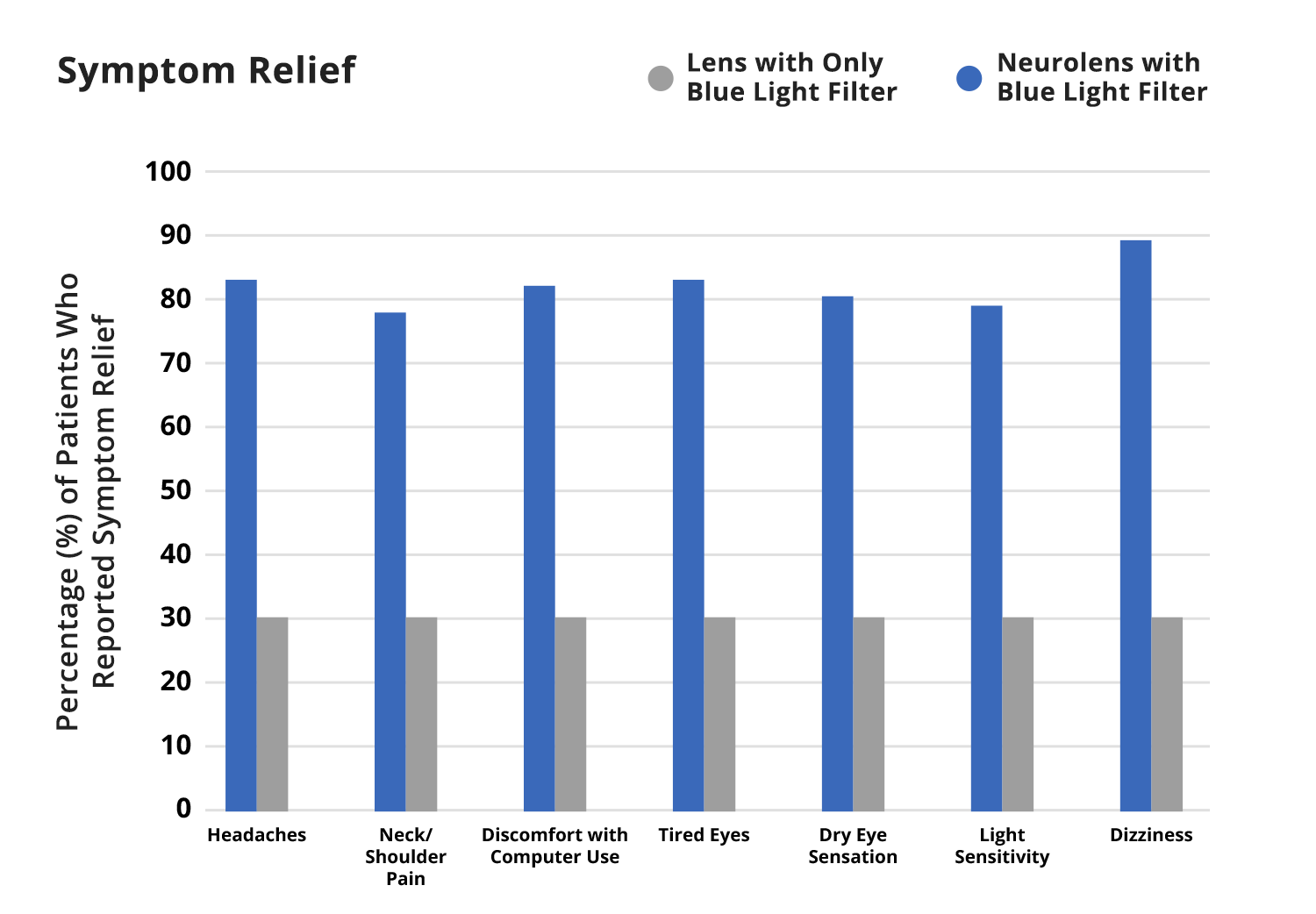
Study Overview: Neurolens Impact on Digital Vision Syndrome
“Specifically, 83.4% reported improvement in headaches, 77.8% in neck pain and 82-84% in eye tiredness or discomfort with computer use.”
Methodology:
This study examined the effectiveness of Neurolenses in treating Digital Vision Syndrome (DVS) compared to standard lenses with blue light filters. The research involved a comprehensive analysis of DVS pathophysiology and a comparison of symptom relief between Neurolenses with blue light filters and standard lenses with only blue light filters. Patient surveys were collected after 60 days of Neurolens wear from practitioners across the country.
Results and Implications:
Neurolenses with blue light filters showed significantly higher symptom relief compared to standard lenses with only blue light filters. Over 80% of Neurolens wearers reported relief from various DVS symptoms, compared to about 30% for standard blue light filter lenses. Specifically, 83.4% reported improvement in headaches, 77.8% in neck pain and 82-84% in eye tiredness or discomfort with computer use. Neurolenses feature customizable, contoured prisms and options for blue light filters, addressing both eye alignment issues and providing protection from blue light.
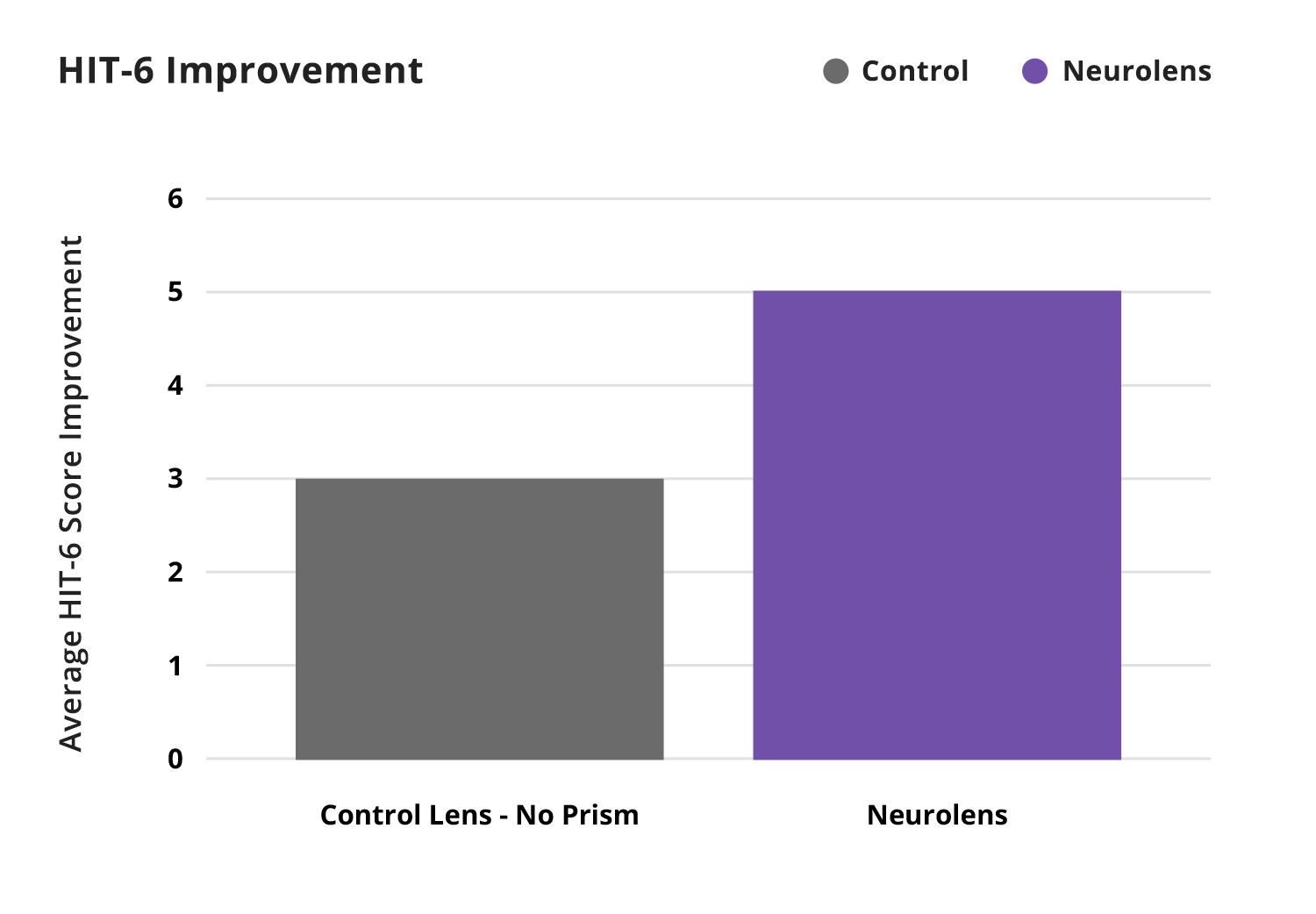
Study Overview: Impact of Small Prism Corrections on Visual Comfort
“For prism corrections ≤2PD, the improvements were slightly higher: 86% for headaches, 77% for neck pain and 80-83% for eye tiredness and discomfort with computer use.”
Methodology:
This study examined the effectiveness of small prism corrections (≤1PD and ≤2PD) using Neurolenses in treating Digital Vision Syndrome (DVS) symptoms. The research utilized the Neurolens Measurement Device, Gen 2 (NMD2) for accurate eye alignment measurements. Patient surveys were collected after 60 days of Neurolens wear from multiple clinical practices across the country.
Results and Implications:
For prism corrections ≤1PD, 84% of patients reported improvement in headaches, 76% in neck pain and 81% in eye tiredness or discomfort with computer use. Similar improvements were observed for both base-in and base-out corrections. For prism corrections ≤2PD, the improvements were slightly higher: 86% for headaches, 77% for neck pain and 80-83% for eye tiredness and discomfort with computer use. Even small prism corrections can provide significant relief from DVS symptoms.
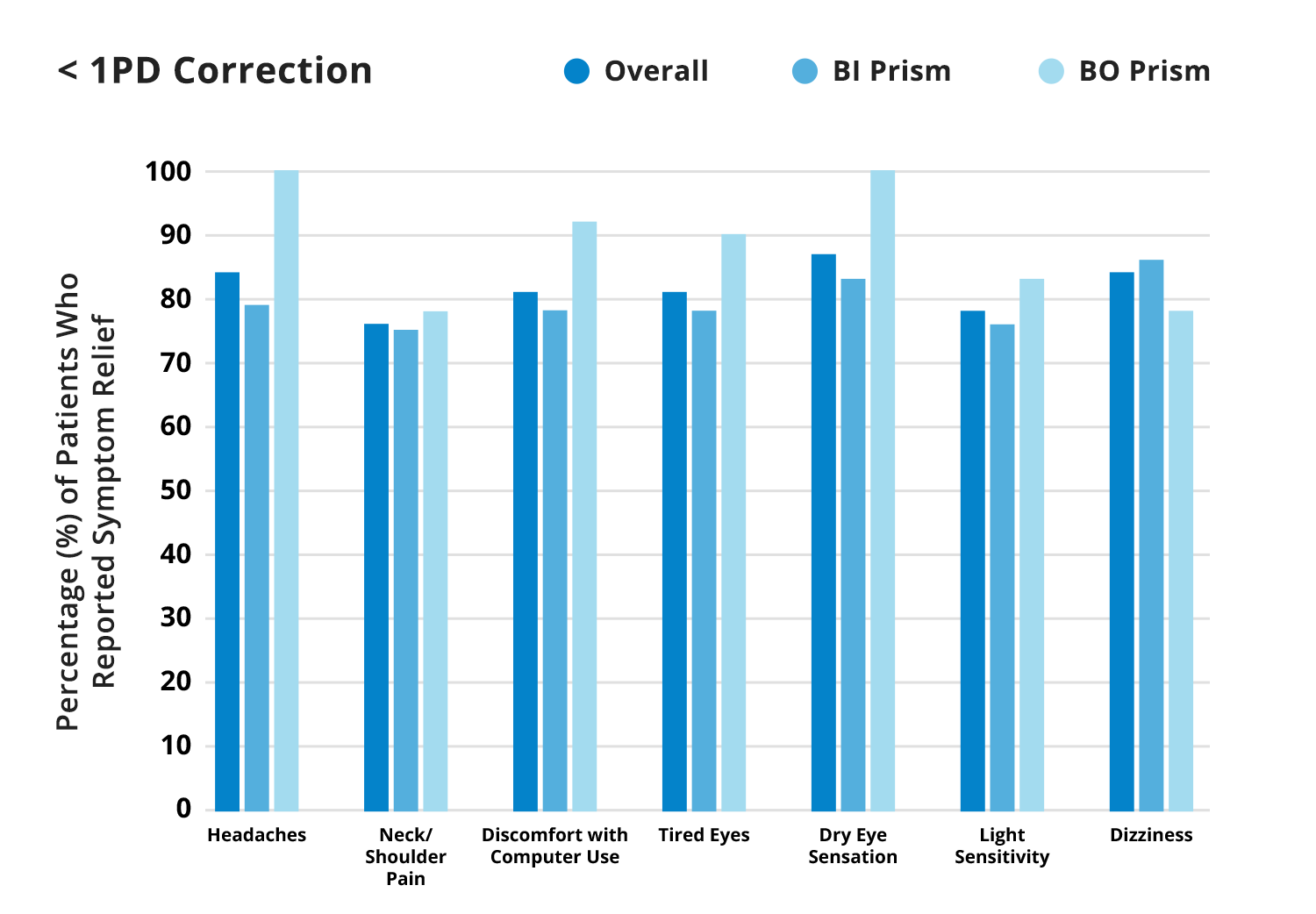
Experience N3 by Neurolens
Book your eye exam with Eye Boutique and ask about the Nuerolens! You’ll receive a thorough evaluation and personalized guidance on the potential advantages of Neurolenses. Schedule your appointment now to start your journey toward clearer, more comfortable vision! *Neurolens is currently offered at our Geneva center.
 Find a store
Book eye exam
Find a store
Book eye exam
